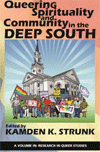
Queering Spirituality and Community in the Deep South
Edited by:
Kamden K. Strunk, Auburn University EFLT
A volume in the series: Research in Queer Studies. Editor(s): Hidehiro Endo, Akita International University.
Published 2019
In this volume, authors explore the interconnected issues of spirituality and community as they relate to queer issues in the Deep South. The book begins with explorations of queer spiritualities and LGBTQ people in religious settings. Next, authors investigate and document the rise of the religious right political movement in the South. Finally, the authors of this text document community life for LGBTQ people in the Deep South, including efforts to create affirming queer spaces inside otherwise hostile locales.
Through the chapters in this text, the peculiarities of spirituality and community life for LGBTQ people in the Deep South are explored. However, this volume also points to trends, themes, and dynamics at work in the Deep South that are also implicated in the queer experience in other parts of the U.S. The authors of this text push readers to think deeply about these issues, probe the limits of queer potentialities in Southern religious and community contexts, and clearly point to the interweaving of Christian religiousness, communities of practice, the operation of white supremacist heteropatriarchy in oppression of LGBTQ people, and the possibilities of affirming spiritual and community praxis.
CONTENTS
Introduction: Queering Spirituality and Community in the Deep South, Kamden K. Strunk. SECTION 1: QUEER SPIRITUALITIES. Spiritual Practices in the Deep South: Queer Theory and the African Diaspora, Jacob W. Glazier. Deconstructing and Reconstructing Queer Spirituality in the South: Intersectionality as a Means from the Micro to the Macro, Christian D. Chan and Philip F. Daniels. At a Crossroads: Growing Up Christian and Queer in the South, Denise L. Levy. SECTION 2: QUEER ANALYSIS OF THE RELIGIOUS RIGHT AND ANITA BRYANT. “We’ve Had It with Anita’s Brand”: Southern Lesbian Feminists’ Response to the 1977 Save Our Children Crusade, Hillary R. Anderson. From Orange Juice to the Ballot Box: Media Coverage of Anita Bryant’s Rise and Fall in the Early Religious-Right Movement, Robert D. Byrd Jr., Melissa Janoske, and Audrey Chaney. SECTION 3: QUEER COMMUNITIES: DEVELOPMENT AND LIVED EXPERIENCES. Gay Liberation Has Arrived: Identity and Community in Lafayette, Louisiana, 1968–1981, Daniel Manuel. Welcome to Pensacola, USA’s Gay Riviera: Beach Parties, Moral Panics, and the Making of a Queer Capital, Jerry Watkins. From James Booker to Big Freedia and Back Again: Black Queer Expression, Agency and Potentiality, Elyse Ambrose and Benae Beamon. Intersecting Identities: Life Histories of Black Gay Males Growing Up in the South, in the “Black Gay Mecca,” Michael D. Bartone. It’s Hard, but It’s Home: On Living in the Deep South, Melanie M. Lantz, Sarah A. McConnell, Brittan L. Davis, and Emily Burish. Conclusion, Kamden K. Strunk. Author Biographies.
REVIEWS
"Queering Spirituality and Community in the Deep South, edited by Strunk (Auburn Univ.), is a relevant and significant contribution to the literature on a region ripe for more study in terms of its queer culture. This collection, part of the "Research in Queer Studies" series, illuminates the South's dominant relationship with religion and its intersectionality with LGBTQ lives. Readers will appreciate essays on queer spiritualities in section 1, queer analysis of the religious right and Anita Bryant in section 2, and queer communities in section 3. The volume builds on common themes, such as backlash against LGBTQ anti-discrimination legislation meant to protect queer workers' rights, thriving LGBTQ communities attacked out of local government fears of becoming gay tourist meccas, and evidence to refute the myth that the South was actually devoid of queer communities when compared to the nation's largest cities. Contributors also allude to progress made; in "At a Crossroads: Growing Up Christian and Queer in the South," Denise L. Levy contends that "as they survive and thrive, LGBTQ individuals in the South impart stories of resilience, courage, advocacy, and hope for the future" (p. 43).
Summing Up: Recommended. General readers and upper-division undergraduates through faculty." J. Goins University of Texas Rio Grande Valley in CHOICE
-
Paperback978-1-64113-573-3
Web price: $45.04 (Reg. 52.99)
-
Hardcover978-1-64113-574-0
Web price: $80.74 (Reg. 94.99)
- eBook978-1-64113-575-7

- SOC060000 - SOCIAL SCIENCE: Sexual Abuse & Harassment
- REL062000 - RELIGION: Spirituality
- HIS036000 - HISTORY: UNITED STATES: General
-
 Exploring Gender and LGBTQ Issues in K-12 and Teacher Education
A Rainbow Assemblage
Exploring Gender and LGBTQ Issues in K-12 and Teacher Education
A Rainbow Assemblage
-
 Negotiating Spiritual Violence in the Queer Community
Negotiating Spiritual Violence in the Queer Community
-
 Pólvora, sangre y sexo
dialogismos contemporáneos entre la literatura y el cine en América Latina
Pólvora, sangre y sexo
dialogismos contemporáneos entre la literatura y el cine en América Latina
-
 Queer Voices from the Locker Room
Queer Voices from the Locker Room
-
 Queering Classrooms
Personal Narratives and Educational Practices to Support LGBTQ Youth in Schools
Queering Classrooms
Personal Narratives and Educational Practices to Support LGBTQ Youth in Schools
-
 Queering Education in the Deep South
Queering Education in the Deep South
-
 Queering Public Health and Public Policy in the Deep South
Queering Public Health and Public Policy in the Deep South

